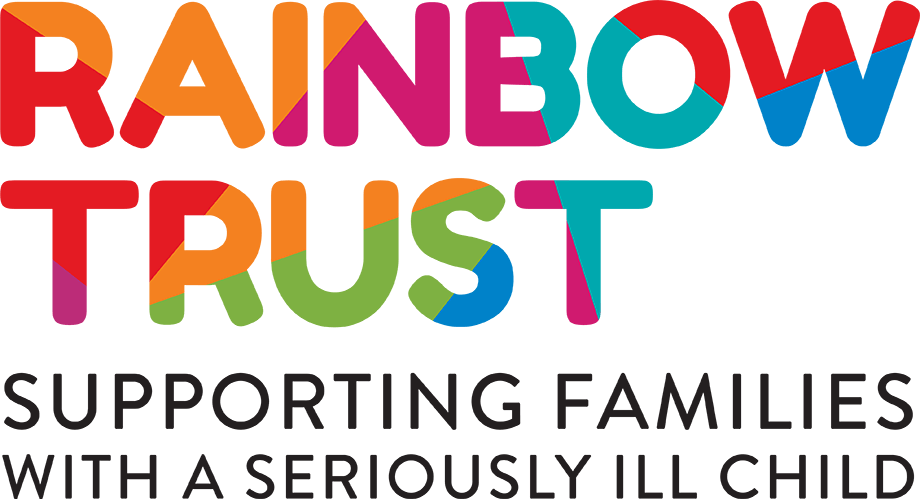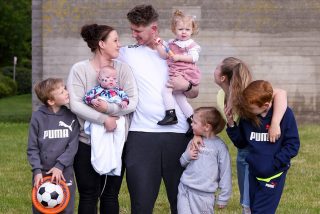Date published: 30 June 2023 by Digital Team
Stable Homes, Built on Love
Rainbow Trust Children’s Charity provides emotional and practical support to families where a child has a life threatening or terminal condition, through pairing our expert family support workers with families to provide tailored emotional and practical support.
Our aim is to enable families to make the most of their time together. Our Family Support Workers support the whole family in the place of their choice, providing bespoke service from diagnosis, through treatment and bereavement. Family Support Workers fill in the gaps between the hospital and hospice, and help link services together.
Chapter 1: Our vision & making reform work for everyone
1. Overall, to what extent do you agree these six pillars are the right ones on which to base our reforms for children’s social care?
Agree. Overall, the six pillars provide an ambitious approach to transforming children’s social care, moving from firefighting towards a more pre-emptive, family-led early interventionist approach. Further analysis into the pillars in relation to children with a life-limiting condition is as follows:
Pillar 1 – Focuses on the variation of support for families and the lack of availability thereof in certain areas leading to a postcode lottery to children’s social care. However, it is also very important to ensure that levelling of care needs to go hand in hand with accessibility to early access to services which is especially necessary for families with a seriously ill child. Parents may not have a diagnosis for their child’s condition or be aware of any condition prior to the birth of the child so it is vital that parents are able to access the support they may need in a timely and consistent manner across the board.
It is promising that Pillar 1 does make reference to the findings of the Law Commission with regard to the need for a review into the legislation on providing help to disabled children and their families, however, there is little information to expand on this point and detail how this will actually take place.
Sick and disabled children and their often rapidly changing needs should be specified and addressed. For too long, society has expected parents to care full time with often limited support for the physical, mental, family, educational and economic pressures this brings. Social care, nursing care, short breaks, sibling support, educational support and welfare support should be integrated to scaffold the family and protect their physical and mental health.
This support should be provided depending on family needs and how they personally wish to be supported. Services will need to be able to respond in a timely and flexible manner and communication mechanisms established between social care, paediatric health services, including paediatric palliative care, education and the voluntary sector.
There is also a real concern in regards to workforce pressures as there is a shortage of social care professionals yet little contracting of charities with a wealth of experience in family support work, such as Rainbow Trust and Together for Short Lives. There is a need to improve and utilise existing services and to make contracting established registered voluntary organisations easier and simpler. Rainbow Trust has over 36 years of experience providing support and care to seriously ill children and their families, but currently only provides state-funded services in a very small number of local authorities/ICSs. The rest of our work is through charitable donations, but budgets restrict our reach and potential to help fill gaps in state provision.
Pillar 2 – Too often there remains a disconnect between social care, health and education. Multi-agency approaches are vital, so we welcome a strengthening of multi-agency leadership. It would also be important for the voluntary sector to be given opportunities to be involved in supporting multi-agency leadership (the 3 statutory partners). Often, charities such as Rainbow Trust will be supporting families in tangent with the support they may be receiving from local services and authorities so it would ensure more coordinated care if services worked closely with other charities offering support to families.
Pillar 3 – An emphasis on the importance of family networks is welcomed. Charities such as Rainbow Trust recognise that support cannot take a ‘one size fits all approach’ and must involve the immediate as well as wider family in order to ensure the best outcome for the child. It is certainly a step in the right direction for families to be given greater say in their child’s care as this will also help to minimise disputes with healthcare professionals and local authorities however, we are concerned that greater detail needs to be provided as to how this may work for families with a seriously ill child.
Changes would also need to be made to the model for families with seriously ill children, who often need more support to manage everyday practicalities, chores, siblings, school, but do not need to share decision making with the wider family. Rainbow Trust is currently researching the all too frequent isolation that they often feel from wider family and friends. Families often have restricted time, mobility and may be simply too exhausted from caring to communicate and delegate their support needs with those who may not fully understand their situation or be able to provide support in the timely and flexible manner in which it is needed. Issues regarding the highly specialised medical care needs of the sick child may limit untrained family or friends offering short breaks. Infection risk may also impact the number of contacts in the home and outside.
Wider family also tend to have their own work and family commitments. Building support networks via family and friends should not replace statutory social care support by trained family support professionals.
Pillar 4 – Having a seriously ill child puts a great amount of strain on individuals, their daily routines and relationships. It is vital that relationships are supported in a tailored fashion to prevent avoidable break down of relationships as research demonstrates that stable homes, contribute to improved mental and physical development as well as more consistent level of care.
There also needs to be significant importance attached to the provision of high quality respite care, sibling support and short breaks to prevent family breakdown and the need for foster care. As found in prior research by the Disabled Children’s Partnership, delays to short break provision for disabled children leads to additional stress for families, a decline in mental health and marital breakdown, all of which are concerning and should be urgently addressed. Children newly diagnosed with serious illnesses need to rapidly be able to access short break services and to be informed how to do so without lengthy EHCP assessments.
Pillar 5 – We support the need for a valued, supported and highly skilled social worker for every child who needs one and for this to go alongside a dedicated plan to support social workers who are central to improving the lives of children and families.
Pillar 6 – This pillar outlines the need for a system to continuously learn and improve whilst making the best use out of evidence and data. A Children’s National Framework that makes the most of technological advancement is important to even out the standard of care but also to allow for learning opportunities in areas where there is clear evidence of good practice for this to also be replicated elsewhere. However, as part of the data strategy, it is important that data is constantly reviewed and procedures in place to ensure that discrepancies are flagged up and a plan of action is adequately put into place. There should also be opportunities for data to be shared with parties involved in supporting the child.
2. What more can be done by government, local authorities and service providers to make sure that disabled children and young people can access the right types of help and support?
There needs to be greater commitment towards ensuring joined up care and commissioning for families. The process should be streamlined so that families are not waiting for lengthy periods and are forced to access different departments for services that form part of the same care package. This leads to a hold up in care and may also lead to families not being able to access the care they need leading to avoidable crisis situations.
There needs to be greater transparency in decision making so we can begin to tackle inequalities in care, and replicate examples of best practice as the process for accessing various types of support can often by complex and emotionally exhausting for families. Waiting lists are also an issue especially for mental health services, which further compounds the difficulties faced by families with a seriously ill child.
Not all families know what help and support is available to them, especially if they do not have a social worker which many do not. Rainbow Trust has experience supporting families that have been declined Continuing Care and Children with Disabilities and Direct Payments so there are questions around where professionals refer to for the family to gain support.
There needs to be greater/improved forms of information sharing, especially with regard to individuals who may have language barriers to accessing or understanding the support available.
Families with a seriously ill or disabled child are often also asking their local authorities for support in areas such as Housing. It is vital that Local Authorities coordinate with health professionals to ensure that the needs of the family are properly taken into account and families are not left in unsuitable accommodation for lengthy periods of time which may exacerbate conditions and lead to a further decline in health.
Rainbow Trust also has experience supporting families where they were unable to return home due to waiting for the continuing care package and appropriate housing in some cases families waiting for several years causing great distress on the family.
The is a need for an effective joined-up budget that is streamlined so families are not waiting lengthy periods of time for access to care services and there should also be greater information about the criteria so expectations can be managed, and families do not miss out on entitlements for their child. There shouldn’t be a finite policy which excludes certain individuals and then leads to people falling through the gaps.
Local authorities need to be given additional funding to ensure that disabled children and their families are able to access short breaks. As part of its Count Disabled Children In campaign, Disabled Children’s Partnership (DCP) analysed budgets and found that, in 2022/23, 50% of local authorities had a real-terms cut in services for disabled children. This is despite it being a statutory requirement for short breaks to be provided to disabled children as part of the Children Act 1989, section 17(6) or under section 20(4).
Furthermore, the bureaucracy and complexity associated with the application process often leads to delays in access to short breaks and children who do not have an EHCP may miss out altogether through no fault of their own.
Consideration also needs to be given to the ethnic and religious disparities in access to care and the differences in how families from different ethnic and religious backgrounds reach out for support. Regarding serious childhood illness and disability, there need to be steps put into place to reduce the stigma associated with asking for outside support to ensure that children and their families have access to all the support they need.
Chapter 2: Family Help
1. To what extent are you supportive of the proposal for a system that brings together targeted early help and child in need, into a single, Family Help Service in local areas?
There is little pushback for the proposal to bring together targeted early help and child in need into a single, Family Help Service however further details need to be provided as to how assurances will be given that the quality will remain high despite the dilution and whether this puts specialisms in early help or child in need at risk. Further details as to how the budget will be distributed within this proposal would also be welcomed.
Bringing services together may have the benefit of reducing the stigma associated with seeking help from social care services and encourage people who need the support to seek it out however, it is important that access to these services is equal in different areas and doesn’t further exacerbate the postcode lottery to various services.
This proposal needs to also ensure that the hurdles families face will be reduced so it would be important to understand what the referral process for a joined-up system looks like and we hope this will be shared in due course.
Experience with families supported by Rainbow Trust also shows that when families with seriously ill children are able to decide what help they would like and when, they do not describe the action as ‘unhelpful’.
2. Looking at the features of early help listed below, in your opinion or experience, what are the top 3 features (from list) that make it a supportive service for families?
i. The service is designed together with the input of children and families
ii. It is based in local communities, and sits alongside other services such as education, libraries, citizen's advice services and housing services.
iii. Early help is delivered by voluntary and community sector as well as the local authority and their partners (police and health)
Chapter 4: Unlocking the potential of Family Networks
1. In your view, how can we make a success of embedding a "family first" culture in children’s social care?
Ensuring that families play a leading role in their child’s care and are involved in the decision-making process is vital. Many families rely on grandparents or other family members for help and support, for example looking after siblings when an ill child is hospitalised. This is a life-line for many families and should be supported practically and financially. Claiming financial support should be simple and straightforward, without the need to formalise arrangements. Kinship caring should not be seen to replace family support, nursing care, mental health support, support groups, respite, and other
support that the state should be providing.
2. In your view, what would be the most helpful forms of support that could be provided to a family network, to enable them to step in to provide care for a child?
In the case where there is a seriously ill child, family members need to be given an adequate level of practical, mental and financial support to ensure that they are able to meet the needs of the child but also be supported and guided throughout the child’s medical journey themselves. Support needs to be offered in a tailored fashion to ensure that the needs of the family are adequately considered and they have the appropriate support system in place.
Often in the case of families with a seriously ill child, the wider family such as grandparents and close family friends are affected and play a central role. In order to enable them to continue providing an element of care there also needs to be a financial safety need so that members are not forced to cover the financial burden alone which can be costly, for example due to the child relying on life-sustaining machinery.
3. What support does your local authority provide to Special Guardians or to a non-parental party with a Child Arrangements Order?
Not applicable.
4. To what extent are you supportive of the working definition of kinship care?
Supportive
Chapter 5: The Care Experience
1. Overall, to what extent do you agree that the 6 key missions are the right ones to address the challenges in the system?
There is no mention of improving outcomes for disabled children and their experiences within the social care system within these missions despite the report highlighting the number of disabled children and children with complex needs in care - “more than half of children in care have a special educational need or disability” and “81% of children living in children’s homes” -there is no specific mission focusing on these children.
There is widespread need for families with seriously ill children to be able access short breaks, also quality nursing care at home. Expecting parents with seriously ill children, who might be dependent on life-support equipment in the home, to care throughout the night, every night, for example, puts children and their parents at risk. High quality short breaks and sibling support services are beneficial to the children, and also help prevent relationship breakdown within families and mental ill health.
2. To what extent do you agree or disagree that a care experienced person would want to be able to form a lifelong legal bond with another person?
3. What would you see as the advantages or disadvantages of formally recognising a lifelong bond in law?
4. What support is needed to set up and make a success of Regional Care Cooperatives?
Please comment below:
We agree with many of the recommendations as set out in the Independent Review of Children’s Social Care in relation to Regional Care Cooperatives.
Care needs to be tailored to the distinct needs of the individual child and groups who are most likely to enter the care system. In particular, it is vital that children are kept close to their community, school, friends and brothers and sisters. Seriously ill children and their siblings already face a deep sense of isolation and loneliness compared to their peers due to the continuous health demands they face. It is important that children are not uprooted and moved around, further exacerbating levels of isolation and loneliness. This also helps to ensure that there is consistency of care for the child and wider family members are still able to be involved in caring duties.
5. Do you have any additional suggestions on improving planning, commissioning and boosting the available number of places to live for
children in care?
6. Are there changes you think would be helpful to make to the existing corporate parenting principles?
7. Which bodies, organisations or sectors do you think should be in scope for the extension of the corporate parenting principles – and why?
8. Do you have any further feedback on the proposals made in the 6 missions of this chapter?
Chapter 7: System Enablers
1. Beyond the proposals set out in this chapter, what would help ensure we have a children’s social care system that continues to share and apply best practice, so that it learns from and improves itself?
The Children’s Social Care Practice Framework should include practice guidance on the specific issues facing families with seriously ill children and the provision required.
Service solutions should be family-led where possible with a compassionate understanding of the practical implications of medical conditions, the challenges balancing needs of siblings, finances and day-to-day life and the impact of isolation and caring on mental health.
A framework for working with and commissioning the voluntary sector specialised in providing health and social care family support to these families should also be developed.
Improved communication and a properly managed register whereby useful information can be shared with families such as benefit entitlements, housing registers and other forms of support available would help to ensure that families do not miss out on support they are entitled to.
Furthermore, there also needs to be a focus on creating a genuine ‘no blame culture’ where mistakes within the system are recognised and support is given to ensure that they are not repeated, and continuous training opportunities for improved practice are regularly offered.
Chapter 8: Delivery
1. In your opinion, how can we ensure the delivery of reform is successful?
The reforms planned are far-reaching and will take time and resources. Collaborating with and commissioning the voluntary sector as described above will be crucial to utilise resources to their maximum effect in a timely manner, and more importantly, to provide seamless support to the families who need it. There is a variety of provision available in the voluntary sector, commissioners should understand the organisations working in their area and the benefits of collaboration.
The commissioning process should be as straightforward as possible for the sector to respond and provide according to organisations’ skills and experience. For example, Rainbow Trust is an expert in providing caring support and short breaks for seriously ill children and practical and emotional support for their families. However, it would be unable to provide similar support to families needing these activities for other reasons, so constantly engaging with the voluntary sector will help to alleviate pressure but will also ensure that families are able to access the best services available to them in a timely manner.




